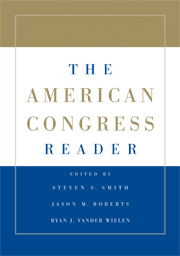Book contents
- Frontmatter
- Contents
- THE AMERICAN CONGRESS READER
- PART I THE AMERICAN CONGRESS: MODERN TRENDS
- PART II REPRESENTATION AND LAWMAKING IN CONGRESS: THE CONSTITUTIONAL AND HISTORICAL CONTEXT
- PART III CONGRESSIONAL ELECTIONS AND POLICY ALIGNMENTS
- PART IV MEMBERS, GOALS, RESOURCES, AND STRATEGIES
- PART V PARTIES AND LEADERS
- PART VI THE STANDING COMMITTEES
- PART VII THE RULES OF THE LEGISLATIVE GAME
- 20 Sample of a Special Rule
- 21 Sample of a Unanimous Consent Agreement
- 22 On the Effects of Legislative Rules
- 23 The Partisan Basis of Procedural Choice
- 24 The Evolution of Agenda-Setting Institutions in Congress
- PART VIII THE FLOOR AND VOTING
- PART IX CONGRESS AND THE PRESIDENT
- PART X CONGRESS AND THE COURTS
- PART XI CONGRESS, LOBBYISTS, AND INTEREST GROUPS
- PART XII CONGRESS AND BUDGET POLITICS
- PART XIII FURTHER READINGS ON CONGRESSIONAL POLITICS
21 - Sample of a Unanimous Consent Agreement
Published online by Cambridge University Press: 05 June 2012
- Frontmatter
- Contents
- THE AMERICAN CONGRESS READER
- PART I THE AMERICAN CONGRESS: MODERN TRENDS
- PART II REPRESENTATION AND LAWMAKING IN CONGRESS: THE CONSTITUTIONAL AND HISTORICAL CONTEXT
- PART III CONGRESSIONAL ELECTIONS AND POLICY ALIGNMENTS
- PART IV MEMBERS, GOALS, RESOURCES, AND STRATEGIES
- PART V PARTIES AND LEADERS
- PART VI THE STANDING COMMITTEES
- PART VII THE RULES OF THE LEGISLATIVE GAME
- 20 Sample of a Special Rule
- 21 Sample of a Unanimous Consent Agreement
- 22 On the Effects of Legislative Rules
- 23 The Partisan Basis of Procedural Choice
- 24 The Evolution of Agenda-Setting Institutions in Congress
- PART VIII THE FLOOR AND VOTING
- PART IX CONGRESS AND THE PRESIDENT
- PART X CONGRESS AND THE COURTS
- PART XI CONGRESS, LOBBYISTS, AND INTEREST GROUPS
- PART XII CONGRESS AND BUDGET POLITICS
- PART XIII FURTHER READINGS ON CONGRESSIONAL POLITICS
Summary
Unlike the House, the Senate does not use special rules to bring up legislation. Rather, the majority leader tries to coax senators to agree by unanimous consent to limit the time for debate or number of amendments that will be allowed for a particular bill.
UNANIMOUS-CONSENT AGREEMENT – S. 214
Mr. REID. Mr. President, I ask unanimous consent that on Monday, March 19, at 2 p.m., the Senate proceed to the consideration of Calendar No. 24, S. 214, a bill to preserve the independence of U.S. attorneys; that when the Senate considers the bill, it be considered under the following limitations: that there be 6 hours of general debate on the bill, with the time equally divided and controlled between Senators Leahy and Specter or their designees; that once the bill is reported, the Committee-reported amendment be agreed to and the motion to reconsider be laid upon the table; that the only other amendments in order be the following: the Kyl amendment regarding the nomination and confirmation of U.S. attorneys; the Sessions amendment regarding appropriate qualifications for interim U.S. attorneys; that debate on each amendment be limited to 3 hours equally divided and controlled in the usual form; that the amendments have to be offered and debated during Monday's session, except as noted below; that on Tuesday, the Senate resume consideration of the bill immediately after the opening proceedings and there be 90 minutes of additional debate time on the bill and the amendments are to run concurrently with the time equally divided and controlled between the two leaders or their designees;
- Type
- Chapter
- Information
- The American Congress Reader , pp. 245Publisher: Cambridge University PressPrint publication year: 2008

